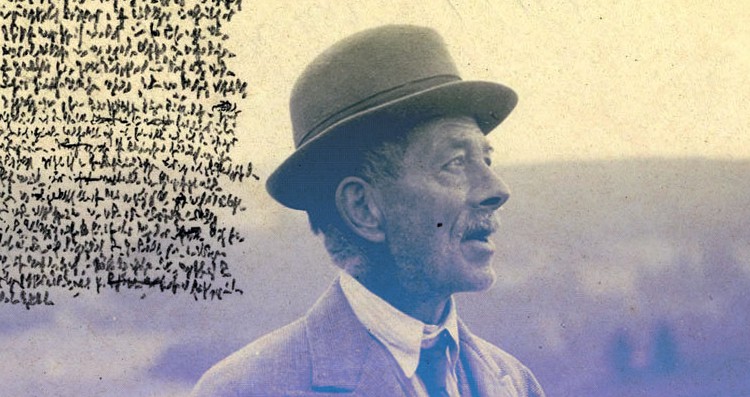Books & Culture
Joshua Ferris Builds Beautiful Machines
In the short stories of his new collection, The Dinner Party, the unforgiving gears of comedy grind away

Typically, when a writer is said to be stylish, it usually means one of two things. Either they use a lot of modifiers and describe things in ornate, sometimes stultifying language and detail, or they write short sentences. Writing in the second category is often described by critics with the (to me) dreaded “taut” or “spare,” useful designations that alert a prospective reader to a dull time ahead. In some cases, the stylish tag is actually deserved and accurate — one thinks of perhaps Karen Russell and Michael Chabon in the first case, perhaps Cormac McCarthy in the second. An essential extravagance, in one direction or another on the spectrum of descriptive usage, being the shared trait.
But it seems to me that there is a third type of stylishness, one that is not typically regarded as style, if it’s even regarded at all. I’m thinking here about rhetorical stylishness, the elegant use of the tools of language to prosecute an argument in narrative. All narrative, of course, is an argument, of one form another, even if the author is unaware of this fact, or even opposed to it. A paragraph-long description of a flower is not only an attempt to convince a reader of certain aspects of the flower’s appearance — it is yellow, it is beautiful, it smells good or has no smell as all — but on a secondary level is also an argument about the narrator or protagonist, i.e. that they are the kind of person who would spend a paragraph describing a flower.
Even so, some writers incorporate argument and the structure of argument as visible, foreground brushstrokes of their work, rather than background wash. An instructive example of what I’m trying to describe here might be to compare Richard Yates and John Cheever, two writers often thought of as similar, both in terms of subject (alcoholic, post-war suburbia) and style (stylish). But where Cheever was a sensualist, an extravagant writer of the first descriptive order, Yates’ style was essentially rhetorical in its nature, his lean and limpid prose, paragraph by paragraph, tracking his characters’ fatal flaws with merciless efficiency.
For a more contemporary instance, consider Adelle Waldman’s The Love Affairs of Nathaniel P. The book lays out a central question — is the main character an asshole? (the answer: kind of) — and attends to it with what amounts to a novel-length Socratic dialog. Nate’s back and forth, at turns self-critical and self-deceiving, is negotiated with wry skill by Waldman, and it amounts to a structural beauty as stylish in character as taut three-word sentences or ravishing descriptions of Paris in dawn light.
Joshua Ferris, in my opinion, might be considered the most stylish current writer of this persuasion. Then We Came to the End, his first (and I think best) novel, derives its pathetic and satirical force from the simple (yet difficult to execute) choice of writing in first-person plural. In doing so, he channels an office’s interior social life as a shared consciousness, which, in turn, speaks volumes about the simultaneously oppressive and communitarian experience of working daily with other people. When the book switches to third-person, isolating one of the central characters, we understand on a syntactical level, before any plot occurs, that the story has shifted to a liberating, terrible isolation. This is a nifty trick by Ferris: to turn the technical apparatus of perspective into the primary means of communicating his moral concerns about the anomie of modern society.
Ferris’s new collection of short stories, The Dinner Party, continues to showcase this facility, in both the successes and failures of individual pieces. The best story in the book, “The Pilot,” offers a glimpse into the psyche of a young screenwriter, Leonard, who has been invited to a Hollywood party. There, he might pitch his new pilot to industry big-wigs, among them the hostess, with whom he has worked before, and who he is unsure meant to invite him in the first place. The story proceeds on the basis of Leonard’s tortured pre-party rationalizations, which may sound like thin gruel as described, but steadily builds a convincing, and excruciating, portrait of indecision:
He was debating inviting his roommate. On the one hand, he’d have someone to go with. On the other hand, his roommate was a musician, and he trembled before the mystical competition of a musician’s night life. What if he invited him and he said no? His roommate had something going on nearly every night, always more vibrant and exclusive-sounding than the pale thing he had going on, and so he felt it better to withhold the invitation than risk suffering the indignity of rejection, even if that rejection was due to a simple conflict of interest, like preexisting plans, for example. It was hard not to take even conflicts of interest personally. Because what if, for instance, his roommate secretly delighted in having a legitimate conflict of interest because of how little he cared to entertain Leonard’s lesser invitation, even when tonight that “lesser” invitation was to a party at Kate Lotvelt’s? If, that is, that invitation still stood.
Two things here — first, this a very funny piece of writing, and Joshua Ferris is a very funny writer. There is a great deal of comic mileage to be had from pursuing this kind of rhetorical strategy to its far limits. It is a satirical comic style that strikes me as essentially British in character — Waugh and Amis (both, but mainly Kingsley), and even Anthony Powell, were masters of setting up linguistic frameworks in which their characters’ foibles could be batteringly exposed, a comic mode perhaps traceable, like most things, back to Shakespeare, with his dissolutely preening Falstaff.
But in these stories this kind of extended riff is never merely for comic effect, and the joke, in its telling and retelling, tends to expose something more serious, often dire. Leonard, in addition to being insecure, is a recovering alcoholic, and the story’s vacillating surface echoes the contest waged within him between sobriety and drink. Likewise Jack in “A Fair Price,” whose inability to stop talking to a taciturn man he’s hired to help him move — initially the kind of gag that drives cringey, David Brentish scenes in sitcoms — steadily reveals the insecure, dangerous child lurking in his core.
Ferris’s fiction is at its best when, in this way, form follows function — when form is function. In “The Breeze,” another of the best from this collection, a woman’s fear of missing out on her own life is dramatized through dozens of iterations of a potential night out with her boyfriend. They go to the park, have a picnic, have sex in the shadows, have drinks with friends, go home satisfied; they never make it out of the subway; they fight and go separate ways; they try to picnic but it’s too dark and he can’t get it up; they go to a miserable dinner in an Italian restaurant; they go to a movie and go home. The story’s confusing, frustrating structure is the point of the story, as it emulates the main character’s crushing sense of imminent loss, fear of losing an ephemeral moment that she loses exactly because of her inability to choose one thing or another.
The weaker stories in this collection, in turn, tend to lack this kind of rhetorical mechanism and feel somewhat slack in comparison. “A Night Out,” for instance, is, like “The Breeze,” the story of a couple’s potential split, but without the former’s structural focus. The story’s climactic moment is an unconvincing deus ex machina: the cheating husband’s other woman turns out to be a waitress at the restaurant where he takes his in-laws. This might fly if the piece was set in Des Moines — maybe — but not Manhattan. “The Valetudinarian” concerns an elderly Jewish man, recently moved to Florida, whose wife dies, who becomes embroiled in a feud with his neighbor, who has a birthday, who is given a prostitute as a birthday present, who suffers a heart attack, who is rescued by the neighbor, who tries to find the prostitute, who runs from the police, etc. The shaggy doggishness of these pieces is at complete odds with the torqued precision of their better cousins, a precision that, in Ferris’s case, seems almost completely derived by figuring out the proper technical angle at which to approach his material.
A Story About the Volatility of a Codependent Friendship
Even so, the more minor stories are still very funny. Here is Arty Groys, the namesake valetudinarian, dispensing morbid life lessons to his two-year-old granddaughter:
“They don’t give you a manual, Meredith, and who’s going to prepare you if not your Grandpa? I’m not going to go pussyfooting around your bowel movements on account of your young age, because one day you’re going to wake up and wonder why the world perpetuated treacherous lies against such a perfect creature as yourself, and I want you to look back on your old Grandpa and remember him as somebody who told you the truth about what’s in store for you, and not as one of these propagandists for perpetual youth just because right now your constitutionals happen to be nice and firm. Do you know what a constitutional is, Meredith? I will tell you.”
That “I will tell you” is a stroke of comic genius, of which there are many in this book. My personal favorite is in “The Pilot,” when Leonard attempts to conquer his party anxiety, not with alcohol, but by dressing up as Coach Taylor from Friday Night Lights. The image of Leonard walking nervously through an industry-packed Spanish Modern, dressed in a windbreaker and ball cap while chewing a toothpick, is an indelible comic moment on the order of Jim Dixon’s drunken “Merrie England” lecture.
Comedy is itself a rhetorical device, and a joke is an argument in perfect miniature. So there’s a logic in a writer of Ferris’s rhetorical facility having equal facility with humor. But many writers are funny, and what sets Ferris apart is his ethical sense, the way his carefully tooled comedic engines turn larger wheels of moral inquiry. As Jack wonders at the end of “A Fair Price,” a reader’s laughter at the joke of his angry insecurity dying along with Jack’s hired hand: “What does a man do — and I mean a real man, a good man — what does a good man do when he knows he’s done something wrong?”
At its best, Ferris’s comic style mimics in language the faulty thinking of his characters, exposing the way people become caught in their own mental processes like factory workers falling into the teeth of great gears. In doing so, these stories propose better ways to survive and live, to be. That this often produces grisly humor and laughs is a secondary, though extremely welcome, effect.








